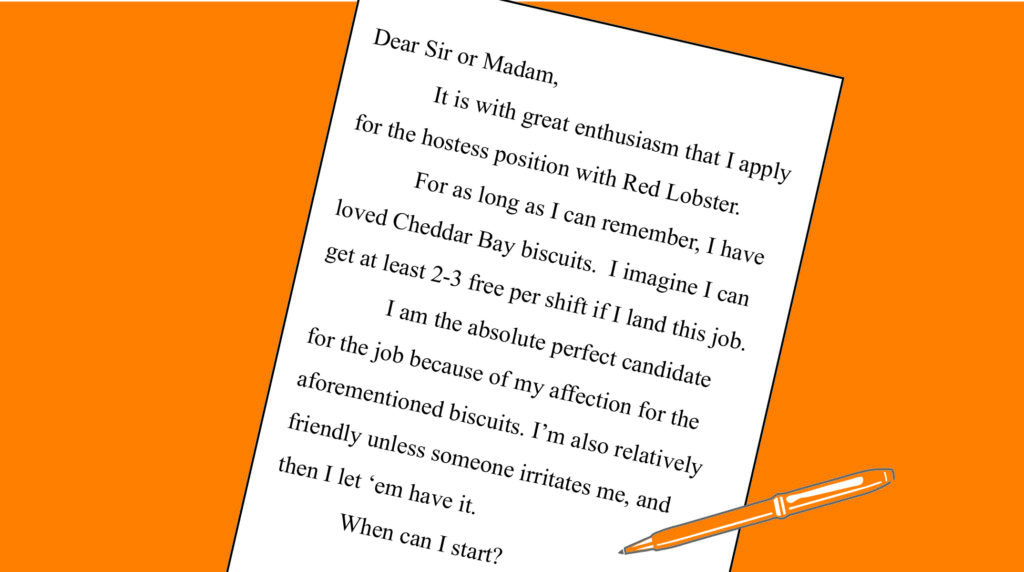 (This month’s newsletter article is the second of a two-part series written by Katelynn Barbosa, who is now on maternity leave.)
(This month’s newsletter article is the second of a two-part series written by Katelynn Barbosa, who is now on maternity leave.)
As you may recall, last month I provided the first five of ten super honest tips about a vital component of every job application – the cover letter. This month I’m giving you the second five.
And if my advice seems anything but delicate, it’s because I am 37 weeks pregnant and not in the mood to mince words!
- It’s filled with errors. Your cover letter needs to be a perfect document with no errors. Why? For most positions, it is the only writing sample the organization has for you and is a testament to your attention-to-detail, focus, and how much you care. Yet I constantly see cover letters loaded with errors. They vary from relatively harmless such as the errant word, a missing letter, or a single misspelling to the egregious: an application package with track changes on, displaying 15 different things someone thought the applicant should change about their resume and cover letter, the wrong organization referenced multiple times, multiple run-on sentences, and so many egregiously incorrect uses of the English language that I suspect the writer wrote it whilst drunk.Your cover letter should always be perfect no matter what, but it’s especially vital when you are applying for a position that requires attention-to-detail or God help you, a literal Editor role. What is an error-laden cover letter supposed to tell me about your ability to edit, the very thing you are applying to get paid to do? What is a cover letter riddled with grammatical sins supposed to make me think if you’re applying to be an attorney, a job that demands so much attention-to-detail that they have a whole book devoted to minutiae like whether to italicize a comma? (True story. It’s called The Bluebook. I highly recommend it if you have insomnia or are trapped on a deserted island with a Supreme Court Justice.)
- You miss the opportunity to answer obvious questions your resume screams. Do you have large gaps in your resume? Are you looking to make the switch from a policy career to a development career? Are you missing critical experience that the job description is asking for? Your cover letter is your one and only chance to address these issues head on, so do it. Tell me what those gaps were about, tell me why you want to leave policy for development, tell me why I shouldn’t freak out that you’re missing experience the job description states as a requirement. If you don’t, I am left to assume the worst.
- You come across like an overconfident windbag. If your qualifications make you a really great fit for the opening, I’ll be able to tell. You don’t need to say “I am indisputably the best candidate for this job,” “no one will be able to match my skills and expertise,” or “my MBA from Ivy U makes me a prestigious candidate.” All that does is convince me it’s a good day to get started on that construction project in my house because I just found a tool.
- You failed to edit. Did I accidentally pick up my copy of Anna Karenina when I meant to get started with my work day? Nope! You subjected me to two rambling pages at a 10 point font and I hadn’t had my morning coffee so I mistook it for Russian literature.Here’s an easy rule for you: don’t submit a cover letter, resume, or anything else with a font size smaller than 12 point font. It’s like when my husband comes up to me apropos of nothing and starts massaging my neck – I know what you are trying to do. I mean, this is how I found myself in this condition. If you make your font so small that you feel morally obligated to ship me a microscope, it’s just a sign you need to edit and cut content. Never mess with formatting to fit your cover letter on one page.On that note, you should try and make your cover letter as close to one or two pages as possible. It’s OK if it spills on to a second page because you’re going into detail about how your background meets the job description. But when a cover letter spills on to page numero tres, it is almost always because you didn’t take the time to carefully edit.
- It’s shorter than that Mother’s Day card you wrote last year. If your cover letter is two short paragraphs, there is zero chance you are covering everything you need to. Getting your cover letter down to an appropriate length should take a lot of time and editing prowess because you should be working to cover why you are interested in the specific opening you’re applying for, why you are interested in the specific organization, and showing why your background matches up well with the position. You simply cannot do that in two paragraphs.
The third trimester stinks but not as much as reading 10 point font general cover letters that don’t follow basic instructions. If you avoid these ten pitfalls, your cover letters will become instantly better. I promise.
-Katelynn




